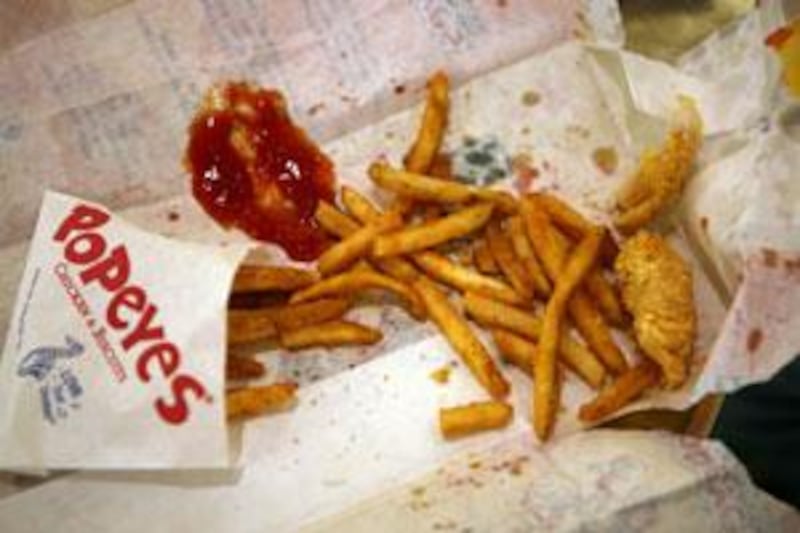ABU DHABI // The tables dotting Abu Dhabi Mall's food court are as packed as ever with diners and their trays of food. Despite being a school night, the queues in front of popular fast food chains are filled with groups of teenagers and young parents clutching the hands of children, all jostling to place their orders for buckets of fried chicken, calorie-riddled burgers and large portions of fries.
Chains such as Hardeez, McDonald's, Kentucky Fried Chicken and Popeye's immediately stand out as the popular choices among diners, with lesser known eateries that offer arguably healthier options forced to make do with a few straggling customers. This propensity to eat fast food among the country's youth has health authorities concerned, especially considering the rising rate of obesity among children and adolescents in the Gulf region.
Khalid al Said, a father of three from Egypt, and his wife Amira moved to the UAE only a few months ago, and have already noticed a heaviness among the country's youth. "Obesity is definitely a problem in the country that has to be dealt with. Here in the Gulf, I've noticed it's very common to see kids that are very fat, kids in the age bracket of nine to 14 years old, and it's very worrying." While Mr al Said and his wife picked at some grilled chicken kebabs, their children Basmala, five, and Zahwa, four, were digging into their French fries with relish.
"We used to take the kids out to eat at least once a week but not any more. We struggle with this of course; they never want to eat their vegetables and yet they'll stuff their faces with chips very easily, but I want the kids to learn about healthy food choices. I don't want them to gain weight later in life," said Mrs al Said. She admitted it was not simply about cooking healthier options at home, but a question of nurturing healthy habits by incorporating fruit and vegetables into children's diets from an early age.
Mr al Said said he was sceptical about the prospects for any research that might try to tackle the problems of increased obesity in the country. "The thing is, here in the Emirates, it's a mall culture, you go hang out at the mall and eat there and the options aren't healthy. "Also, I think it's very hard to control kids. Having an obesity study is important and trying to teach kids about healthy choices and raising awareness is something to be admired, but will it work?"
Mona Hussein, mother of seven-year-old Tayeb and four-year-old Kareem, admits to feeding her boys at fast food restaurants around twice a week. "I don't want the kids to get used to eating fast food all the time, so we just feed the craving by taking them ourselves occasionally without having them ask for it." Her husband, Mohammed, sees the increase of obesity in children as related to the lifestyles of working parents.
"This modern life means parents are all working and have no time to cook a healthy meal when they come back from work. Kids end up snacking and ordering take-away. "I think fast food becomes like an attractive drug to kids and it stays with them all their lives; it's delicious and colourful for them, it comes with a toy or gift, it is so well packaged. "The kids love it and everyone knows it's not healthy, but they don't really care. Kids are not the ones who watch out for their health; it's our responsibility as parents to teach them and watch out for them."
The Al Deen family were all enjoying meals from McDonald's, but said it was a rare treat for their kids. "Of course we make sure the kids eat healthy," said Nirmeen al Deen, mother of Ahmad, nine, Nouran, eight, and 11-month-old Mohamed. "I put apples and bananas and carrots in their lunch boxes when they go to school, and fast food is only allowed on weekends when we all go out as a family." Um Abdullah, a 29-year-old Emirati, was also enjoying a meal at McDonald's with a friend. She complained of how tired she was of the sight of her nieces and nephews, teenagers ranging in age from 13 to 16, trekking back and forth to the fried chicken chain near their home. Lately, the teenagers' parents have forbidden them to eat take-away fried chicken.
"The kids are really gaining a lot of weight; they never exercise, they're always refusing to eat at home and heading out for burgers instead. It's like they're addicted to this kind of food, and we need to get it into their heads that it's not healthy and very bad for them." Maana'a al Hababi, 36, and his cousin Haddaf, 29, felt guilty about digging into their Hardeez burgers. "I avoid this food usually," said Maana'a. "I was very obese all my life and although I'm still overweight, I've lost a lot of weight just from avoiding this kind of food that has little nutritional value. It just tastes good, that's all. You have to try and convince yourself it's poison for you.
Fifteen-year-old Rasha and her two friends, Lubna and Khitam, further reinforce the idea of teenagers' eating habits being unsupervised by parents. "We like this food better," said Rasha, gesturing at the burgers, fries and soft drinks on the table in front of the three girls. "I don't like fruits and salads and that stuff; if I don't like something my mom cooked at home, we just order take out or something."
hkhalaf@thenational.ae






